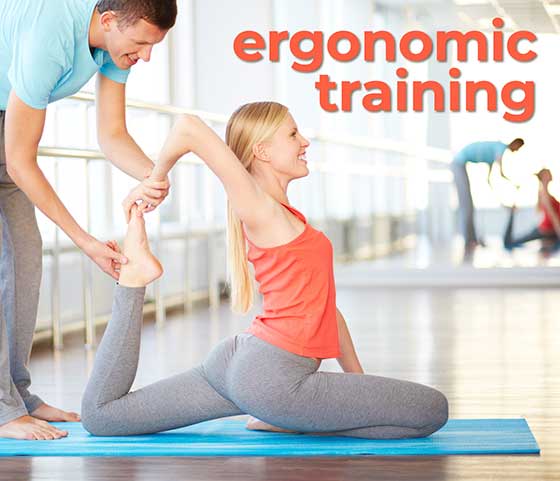Ergonomic training refers to the education and guidance provided to individuals in a workplace to promote proper ergonomic practices. Ergonomics is the science of designing and arranging the environment to fit the people who use it, aiming to enhance efficiency, comfort, and overall well-being while minimizing the risk of injuries or discomfort.
Ergonomics training goals is to reduce stress and eliminate injuries and disorders associated with the overuse of muscles, bad posture, and repeated tasks. In addition, a ergonomics training program can aim to prevent or control injuries and illnesses by eliminating or reducing worker exposure to risk factors. But its not just at work, this also applies for home activities.
By investing in ergonomic training, organizations aim to create a healthier and more comfortable work environment, leading to increased productivity and reduced absenteeism due to work-related injuries or discomfort. At Revolve Physiotherapy we offer personalized treatment plans that are tailored to each individual’s needs and goals. Come talk to us and meet the best physiotherapists in Milton, Ontario.
Here are some key aspects of ergonomic training:
- Posture Awareness: Employees are educated on maintaining correct posture while sitting, standing, or performing specific tasks. This includes proper alignment of the spine, positioning of the wrists and hands, and overall body mechanics.
- Workspace Setup: Training covers the proper arrangement of workstations, including the placement of monitors, keyboards, chairs, and other tools. Adjusting the height of chairs, desks, and computer screens can contribute to a more ergonomic setup.
- Use of Ergonomic Tools: Introducing and demonstrating the use of ergonomic tools and equipment, such as adjustable chairs, ergonomic keyboards, mice, and monitor stands, helps employees understand how these tools can support their well-being.
- Regular Breaks and Stretching: Encouraging employees to take regular breaks and incorporating stretching exercises into the work routine helps prevent stiffness and reduces the risk of musculoskeletal issues.
- Lifting Techniques: Training on proper lifting techniques is crucial, especially in jobs that involve heavy lifting. This includes using the legs instead of the back and avoiding awkward postures.
- Awareness of Warning Signs: Employees should be educated on recognizing early signs of discomfort, strain, or pain. This awareness can prompt individuals to take action, such as adjusting their posture or requesting ergonomic assessments.
- Ergonomic Assessments: Conducting ergonomic assessments of workstations and job tasks can identify potential issues and provide personalized recommendations for improvement.
- Educational Materials: Providing written or digital materials on ergonomics can serve as a reference for employees. These materials may include guidelines, tips, and illustrations demonstrating proper ergonomic practices.
- Encouraging Communication: Establishing an open line of communication between employees and management encourages the reporting of discomfort or ergonomic issues. This allows for prompt intervention and adjustments.
- Continuous Improvement: Ergonomic training should not be a one-time event. Regular updates, refresher courses, and feedback mechanisms can help ensure that employees continue to prioritize and implement ergonomic principles in their daily work routines.
What are the Benefits of an Ergonomic Training?
Ergonomics Training reduces the risk of injury in the workplace. In addition, an ergonomic assessment by a physiotherapist has many benefits. For example, we can quote:
- Feel comfortable in your work activity
- Work efficiency can improve
- Reduction in sick leave
- Suffer less musculoskeletal injuries
Physiotherapists are ideal professionals to conduct an ergonomic training. Above all, they have the knowledge of the biomechanical functions of the body and the effect stresses can have on it.
Our team will guide you to increase your knowledge of ergonomics in order to recognize potential ergonomic problems in your office environment. Also, it explains several common ergonomic risk factors in a typical office workstation.
By learning these principles and risk factors, certainly your awareness of their importance will be heightened and your ability to assist in finding solutions will be greatly improved.
At Revolve Physiotherapy you will feel at home, metting our friendly team of Specialists. Call us now 905 864.8181. It will be a pleasure be talking to you, or book online clicking the button below.
